RECON’s concluding conference discusses key findings from the 5-year long project (2007-2011), which has focused on the conditions for democracy in Europe. The greater, more overarching implications that this collective research effort has generated will be discerned at this academic conference. But due attention will also be paid to the most pressing issue currently facing the EU, namely the financial crisis. The first part of the conference is thus devoted to discerning the main lessons from the financial crisis and the likely implications for the EU.
About the conference
The conference was organised by RECON coordinator ARENA – Centre for European Studies at the University of Oslo. The close to 80 participants consisted of a large number of RECON’s researchers, as well as externally invited scholars and practitioners who contributed as paper givers or discussants, and some external researchers, students and members of NGOs. The external contributors added to the multitude of insights, and included Giandomenico Majone, Pedro Teixeira, Agnès Hubert, Michelle Everson, Anne Maria Holli, Inger Johanne Sand and Paul Statham.
Full list of participants (pdf)
Programme (pdf)
Europe in the time of crisis
Against the backdrop of the euro crisis, the first day was kicked off by the keynote speech 'Political and Normative Limits to Piecemal Integration: Rethinking the European Project after the Crisis of the Monetary Union' by Giandomenico Majone (Emeritus Professor, European University Institute). He argued that the current crisis reveals the problems of the relationship between integration and democracy and the trade-off between the two in favour of the former. Integration has been promoted as an elite project without democratic anchoring - as an elite projectthat is first and foremost politically integrated along technocratic lines. However, this Monnetmethod of piecemeal, ‘disembedded’ integration where elites cooperate without involving thepeople has reduced reduced EU law to ‘thesmos’, not ‘nomos’, that is, law for the people, not by the people. The current crisis is a symptom of the failed integration strategy, in his view, or at least of its limits, due to the lack of a sufficient normative basis for continuing the process on the same track.
In her comment, Cathrine Holst (ARENA) questioned the underlying premise of Majone’s argument, namely what the notion of social embeddedness requires and how to specify and justify more precisely what the structural limits to deep or positive integration consist of. Also Stefan Collignon (Sant’Anna School of Advanced Studies, Pisa) took issue with the notion of social embeddedness as a precondition for further political integration and democratisation in Europe. Instead he argued that common institutions must be established in order to allow for democratic procedures to evolve and to ensure further integration.
Pedro Teixeira (European Central Bank) presented a paper co-authored with Edoardo Chiti (University of Tuscia) and Agustín J. Menéndez (University of León), providing a nuanced version of the origins of the crisis. Teixeira argued that there is not just one European crisis but five interdependent crises. The European response to the overall crisis has resulted in a partial renationalisation of the EU, jeopardising the basic constitutional principles and institutional framework defined in the Treaty, and paving the way for executive emergency constitutionalism. This may finally lead to the failure of the whole integration project, either through outright collapse or through mutation into a new and different integration project. Michelle Everson (Birkbeck, University of London) in her comment looked at the situation from a different angle, but nevertheless agreed with the authors’ basic argument that there is a problem of lack of rule of law in the EU today.
The session ended with a panel debate where some of the topics were discussed in more detail, discussing questions such as how the European Parliament can be representative in economic policy for all 27 member states when only 17 are part of the euro zone, and how much embeddedness is needed to sustain a market in Europe today.
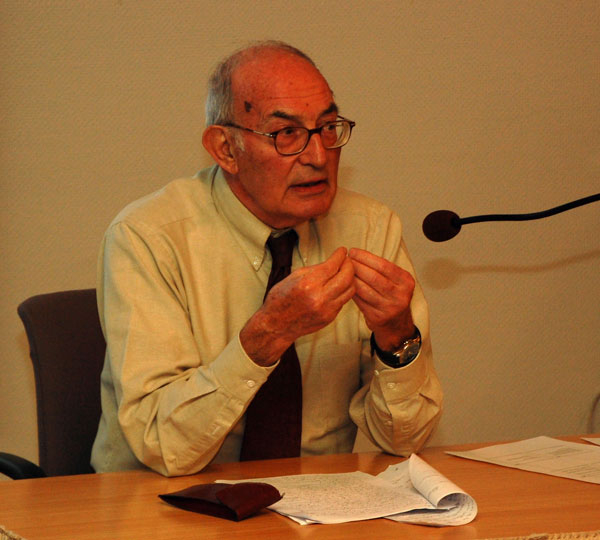
|
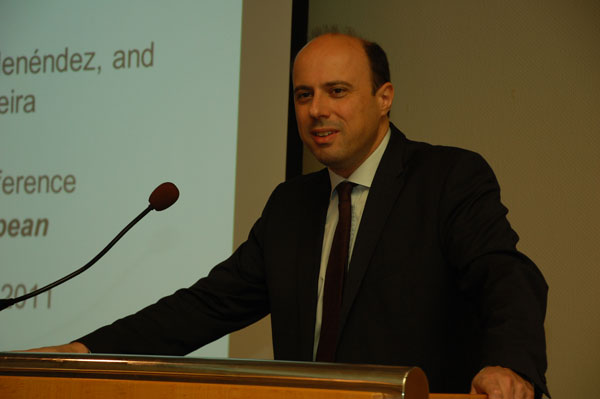
|
Representation after Lisbon
Whereas the focus of the first session was particularly tailored to RECON’s research on the EU’s political economy, the next sessions was devoted to the presentation and discussion of selected papers based on the project’s broader research agenda. Christopher Lord (ARENA) pointed to the problems of compound representation in the EU after Lisbon. He argued that a conflict might arise between compound representation and the strategic leadership of the European Council after the entry into force of the Lisbon Treaty. Lord presented three justifications for compound representation and some minimum system requirements, resting on greater inter-parliamentary coordination. Carlos Closa (Spanish National Research Council, CSIC) in his comment reflected upon the question of how compound representation in the European Union is defined.
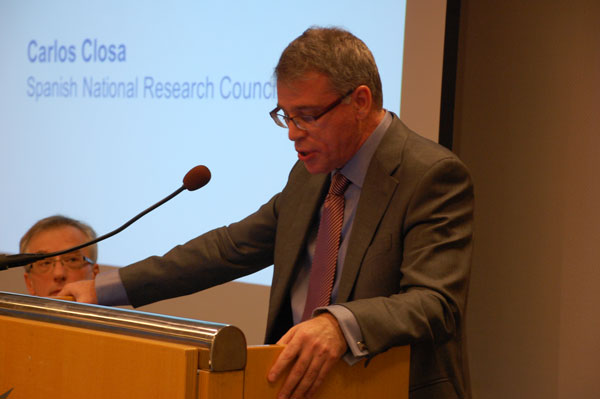
|
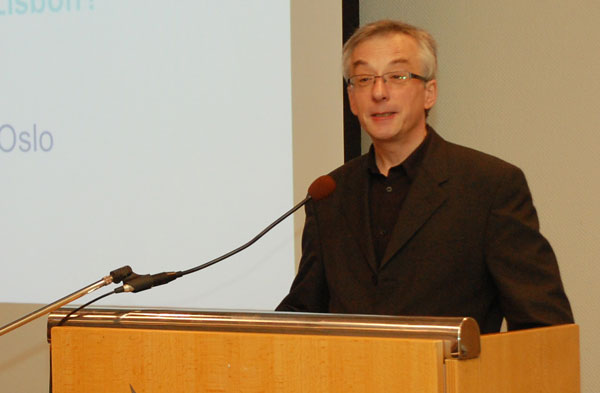
|
Media as a carrier for politicisation
Hans-Jörg Trenz (ARENA) and Paul Statham (University of Bristol) presented research on the politicisation of Europe, arguing that media discourse is a central carrier for politicisation. They found that a mediated public debate usually takes place at a national level and challenges the national elite. As a consequence, national elites take different stances and are pushed towards choosing sides. The question remains what kind of Europe politicisation will lead to? And can a decensus (as opposed to consensus) become so strong that it breaks the pro-integration elite? The transformation of the public debate during the development of the European constitution was presented as an example of politicisation, pointing to the French referendum which started a domestic debate on the European status quo. Due to several factors, such as a greater divide between creditor and indebted countries, the uncontrollable development of the crisis, high media attention and the mobilisation of public and opposition, the euro crisis also has a potential for a high degree of politicisation. Cathleen Kantner (University of Stuttgart), commended their rich research for placing the public sphere into the discourse, and raised specific questions about the political bias of the interpretation of the Euro crisis.
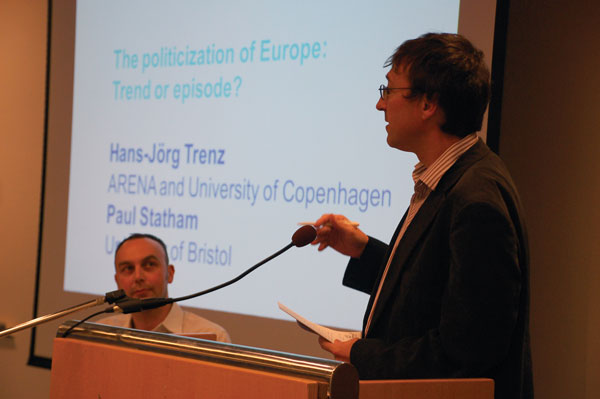
|
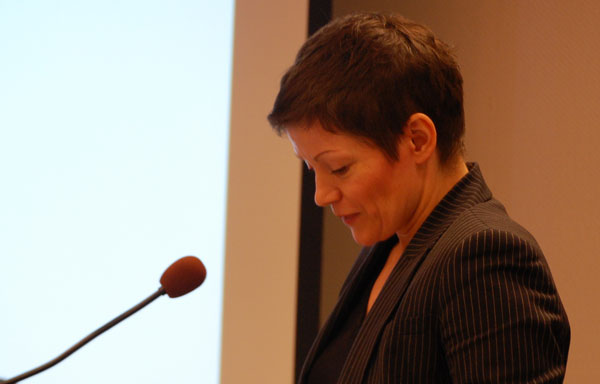
|
European identity in flux?
Meltem Müftüler-Baç (Sabancı University, Istanbul) discussed the EU accession process of Turkey and multiculturalism. She argued that the EU’s particular identity shapes its relationship with Turkey, and that this identity is challenged by multiculturalism. However, the EU, as a cosmopolitan order, can be viewed as a political project that embraces multiculturalism and Müftüler-Baç’s research maps key actors in this debate and discusses how they understand the EU. She claimed that this possible enlargement may become quite defining for Europe. Helene Sjursen (ARENA), highlighted the importance of this research for our understanding of Europe and the EU. Sjursen however pointed to some missing voices in Müftüler-Baç’s analysis – those who are in favour of Turkish accession, and moreover challenged her to reflect upon the question of borders.
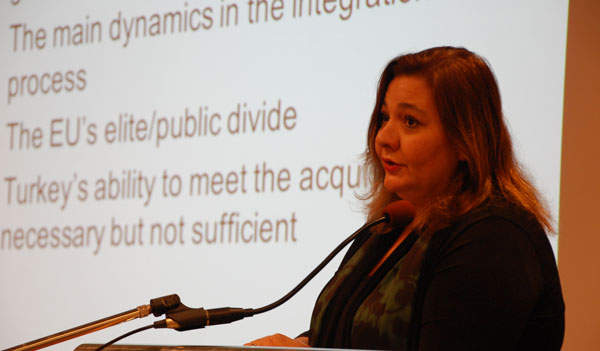
Deliberating difference
The second day was devoted to further papers presenting some of RECON’s research. Sara Clavero (Queen’s University Belfast) discussed how current arrangements in the EU obstruct or enhance the gender-democratic quality of decision-making. She presented research that applies three principal indicators from deliberative democracy theory to selected EU decision-making processes of gender equality. Findings suggest that there is partial inclusion of women’s representatives in the decision-making process, partly due to the technocratic nature of EU initiatives, leading to the self-exclusion of some groups and the power imbalance between gender equality lobbies and other groups. On accountability, the research points to a lack of transparency regarding the granting of preferential access to lobby groups; in consultation procedures there is no follow-up of proposals or opinions once they reach the Council; and gender-equality issues are generally absent in national media. Finally, although deliberative practices in the EU with regard to the recognition and respect of women’s claims and voices are highly formalized, gender interests are pushed to the back of the agenda. Clavero concluded that current EU arrangements place serious constraints on gender democracy. Anne Maria Holli (University of Helsinki) praised the methodology and its appliation to gender studies, but also raised the question of if and how the approach could be applied to other policy areas.
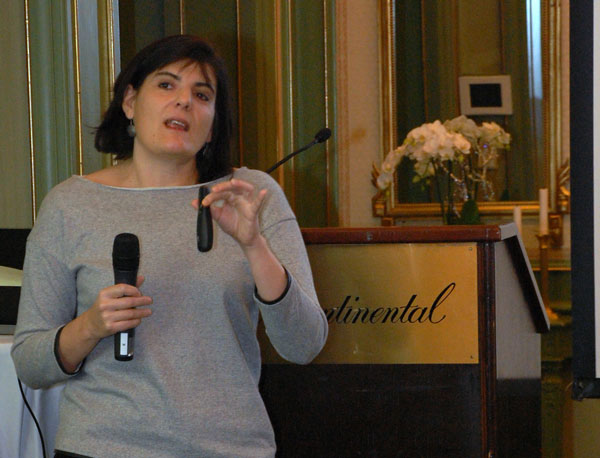
|
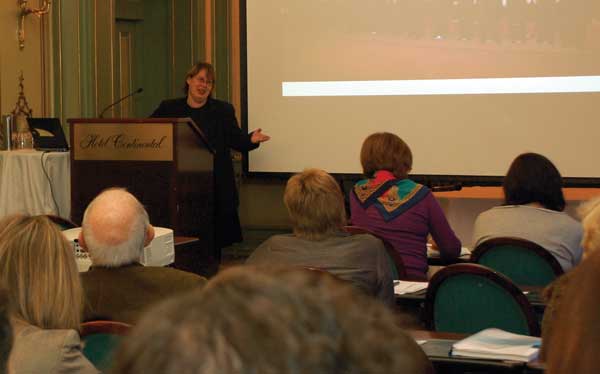
|
Parliaments in security politics
Wolfgang Wagner presented a paper co-authored with Dirk Peters and Cosima Glahn (Peace Research Institute Frankfurt) on the role of national parliaments in the case of the EU’s maritime mission Atalanta. This mission was decided and planned upon in a highly structured way that made it difficult for parliaments to have an impact. Wagner argued that parliaments are a key player for democratic control, which should be involved also in the area of security and defense. By studying national parliaments, the European Parliament and inter-parliamentary cooperation, their analysis shows that none of the parliaments were actively involved in the mission’s planning process, and that there is a patchwork of parliamentary control at the national level. This in turn limits the quality of democratic decision-making. Once launched, however, the mission was actively monitored by the EP. Parliamentary assemblies were also found to provide important opportunities for national governments to exchange and gain information on a military mission. Wagner concluded that there is a democratic deficit in the defense area due to structural obstacles. Christopher Lord raised questions such as why the European Parliament makes such an effort in an area where it has very few formal powers, and what constrains national parliaments’ involvement.
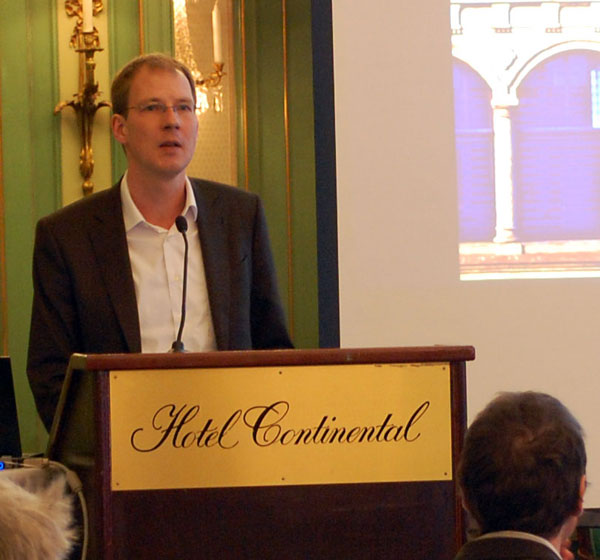
Integration through law
Christian Joerges (University of Bremen) finally presented research on the future of integration through law. After giving an overview of the evolution and legacy of this research, he discussed European law as being in a state of socio-economic malaise. Three conflict scenarios illustrates how the law is under threat, in his view. The three examples correspond to Polanyi’s categories of money, labour and land. For the money example, Joerges used the institutionalisation of the monetary union and the ruling of the German Constitutional Court on the bail-out of Greece. For labour, he referred to the European Court of Justice’s labour law jurisprudence and the failure of the EU to create a welfare state. And for the land example, he used the institutionalisation of nuclear energy in the EU since the 1950s. He concluded that moves are underway towards a reconfiguration of the law-politics relationship. Inger Johanne Sand (University of Oslo) largely agreed with Joerges’ conflicts of law perspective, but from a more sociological, rather than normative perspective, she saw a crisis of regulatory asymmetries at the EU level rather than a crisis of law.
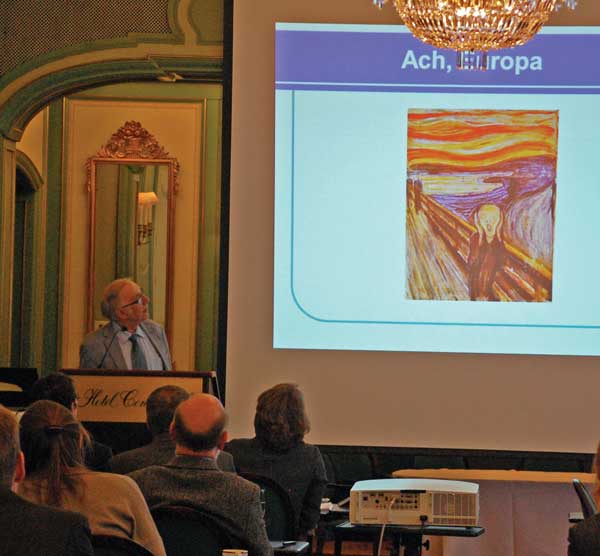
The future of European democracy
The final panel debate on the future of the European democracy touched various topics and was as multifaceted as the RECON project itself. RECON’s ‘founding fathers’ Erik O. Eriksen and John Erik Fossum recollected some of the main questions and challenges the RECON project set out to solve and presented what has been learned during five years of research. Responding to the need to theorize a democratic alternative to the nation state and a federation, they pointed to the cosmopolitan model, which has been developed within RECON. They summarised the innovations of RECON’s theoretical framework and discussed it in the broader perspective of the challenge of European democracy from a combined normative and analytical perspective. In the paper ‘What democracy for what Europe?’ they laid the framework of a regional European democratic order by reflectively adjusting the principle of democratic self-government to their well-considered judgments of the present political order in Europe. Building on conceptual innovations such as state-less government, constitutional synthesis, multilevel parliamentary field, layered sphere of publics, and working agreement, they fleshed out the core elements of a new conceptualisation of regional European democracy.
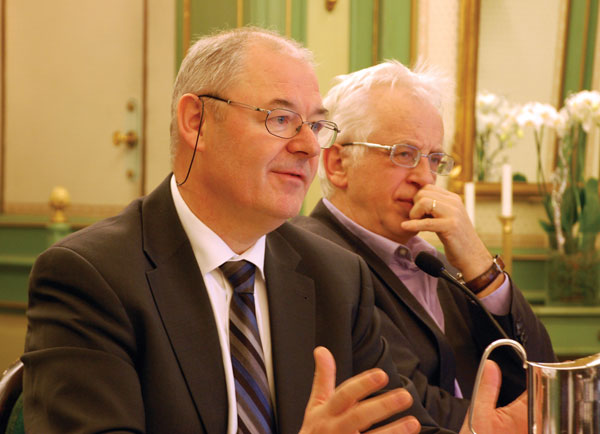
|
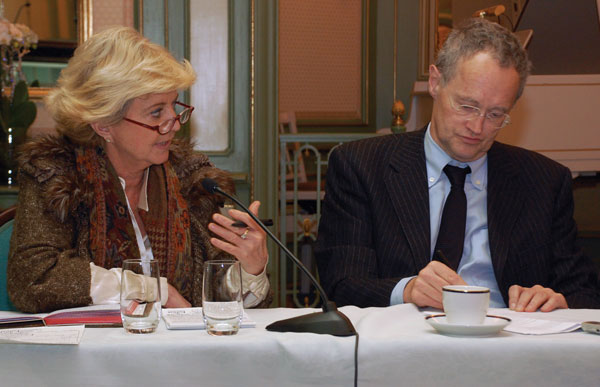
|
Hauke Brunkhorst (University of Flensburg) and Rainer Forst (Johann Wolfgang Goethe University Frankfurt) discussed how the EU was originally designed as an instrumental community. Brunkhorst explained the democratic deficit by pointing to the fact that the EU was founded on an economic, not political, constitution, whereas democracy should have been part of the constitution from the outset. Forst argued that a future challenge is to invent a democratic language for the EU, as the existing one is reserved by the political elites for the national democracy.
Agnès Hubert (Bureau of European Policy Advisers, European Commission) expressed the concern that tighter European integration, which is being promoted by the Commission in response to the crisis, is taking place without public contestation and deliberation. She also underlined the need for creative thinkers and conceptual innovation. Ben Crum (Vrije Universiteit Amsterdam) argued that although national representatives link the national public spheres together as they engage in deliberation at the European level, they are not always able to link the two levels in the demanding two-level game. He underlined that a strong European democracy depends on strong national democracies, and that democracy at the two levels should not be played out against each other.
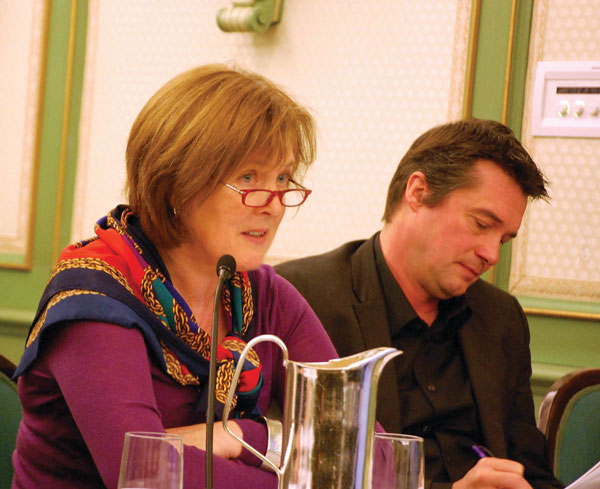
|
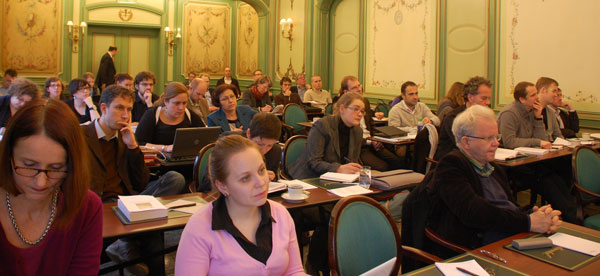
|
Providing a concrete example of executive-led processes, Helene Sjursen pointed to RECON findings showing that in decision-making processes within the foreign and security area the citizens are left behind. The EU commits itself to certain principles which point in the direction of a cosmopolitan order, but agreements are made behind closed doors and executive integration without parliamentary control is taking place. As a starting point in dealing with the democratic deficit, Yvonne Galligan (Queen’s University Belfast) argued that to go forward with building, deepening and developing European democracy in the future, the Charter of Fundamental Rights could be taken as basic expression of the fundamental values of Europe. The Charter defines some shared values based on the rule of law, human rights and democratic contestation, and could thus constitute a basis of popular democratic legitimacy.
See also RECON's Press Room for a commentary by Cathrine Holst in the weekly newspaper Morgenbladet (in Norwegian), where she presents Majone's view that there are only two ways out of the crisis: deeper European integration or a downscaling to a more limited economic cooperation between sovereign nation states. Questioning Majone's view that the latter is a more probable outcome, she points to research findings from RECON which contradict the 'no demos' thesis.